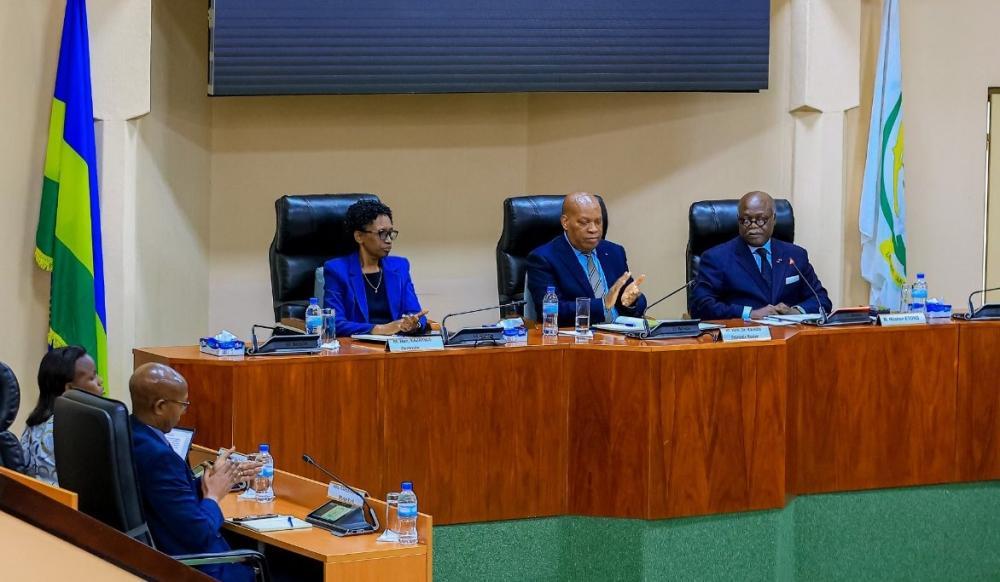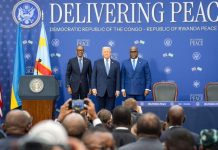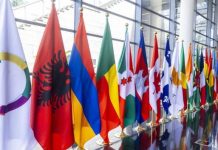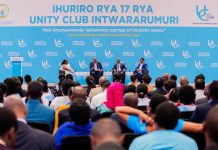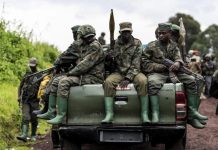Africa-Press – Rwanda. The president of the Parliamentary Assembly of La Francophonie (APF), Hilarion Etong, has expressed optimism for the establishment of an inter-parliamentary committee bringing together Rwandan and Congolese lawmakers as one of the means to support efforts geared at attaining a sustainable solution to the conflict in eastern DR Congo.
He made the observation on Wednesday, May 28, as his delegation visited the Parliament of Rwanda.
The visit was in line with APF’s parliamentary mission of “good offices”, which aims to support the search for sustainable solutions to the conflicts in eastern DR Congo. This approach is part of the APF’s objective of promoting dialogue, peace, democratic governance, human rights, and solidarity among its members.
Rwanda’s Senate President François-Xavier Kalinda described the APF mission as “of great importance to us,” because it contributes to strengthening bilateral cooperation, parliamentary diplomacy, peace and security in the Great Lakes region.
The APF delegation came to Rwanda after visiting DR Congo. Both countries are members of La Francophonie — an organisation of French-speaking nations.
Etong said that in the context of the mission of good offices, they listen to both parties [DR Congo and Rwanda], adding that “the will for peace is manifested” in the two countries.
“We cannot yet say that we have come to a conclusion,” he said of the impact of the discussions, adding “tendency seems to go towards the establishment of an inter-parliamentary committee [of] the Rwandan parliamentarians and the Congolese parliamentarians who can meet and exchange ideas, sometimes in Kigali, sometimes in Kinshasa.
Kalinda said that the conflict in the east of DR Congo is one of the most complex and persistent in Africa.
Kalinda indicated that the conflict draws its deep roots in a combination of historical, political, economic, identity and geo-strategic factors. These deep causes are at the same time linked to colonial heritage, to the consequences of the genocide perpetrated against the Tutsi in 1994, the identity and border tensions, the weakness of state institutions, and the absence of efficient governance, he indicated.
With regard to colonial heritage, he said that Belgian colonialists left a politically chaotic country, with arbitrary borders and without a sense of national unity.
Ethnic divisions have been instrumentalised, favouring certain communities at the expense of others, thus sowing distrust and tensions, Kalinda said, pointing out that in the east of DR Congo, there is a historical competition between local communities centred around land issues and nationality, and power.
“Some communities, such as the Congolese Tutsi, are regularly stigmatised and perceived as foreigners, which feeds ethnic hatred and violence,” Kalinda said.
After the genocide perpetrated against the Tutsi in Rwanda in 1994, hundreds of thousands of refugees, including the genocidaires, settled in the east of DR Congo and regrouped in a militia called FDLR, he told the visiting delegation. This armed group has always used the east of DR Congo as a rear base to destabilise Rwanda, causing continuous regional tensions.
Concerning the weakness of state institutions and the absence of state governance, he said, it should be noted that the Congolese state does not exercise real control over the east of the country, thus leaving a security vacuum exploited by more than 250 active armed groups.
Corruption, the instrumentalisation of the army, and the absence of public services, worsen the vulnerability of the population.
“Rwanda has not stopped denouncing the active presence of FDLR, which, although described as a terrorist group by the United Nations, the African Union and the European Union, continues to operate in DR Congo with the support of the Congolese armed forces,” he said.
By ignoring the deep causes of the conflict, both by the Congolese government and by the international community, he said, the crisis in the east of DR Congo “has been deliberately misinterpreted, reduced to unfounded accusations against Rwanda, including allegations of illegal exploitation of natural resources and of expansionist aims.”
The situation was worsened with the resurgence of the M23 rebellion, in November 2021, followed by the refusal of the Congolese government to implement the Nairobi declaration signed in 2023.
“Rwanda has always called for a political solution. This involves the withdrawal of foreign troops from the military coalition of DR Congo and direct talks between the Congolese government and M23 to tackle the deep causes of the conflict as well as the neutralisation of FDLR,” Kalinda stated.
“Rwanda requires lasting security guarantees along its border with DR Congo,” he added.
For More News And Analysis About Rwanda Follow Africa-Press

